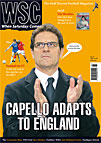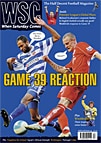What are the expectations for the team?
After the astonishing 2006 World Cup, public expectation is high, especially since Germany had the luck of the draw again and all the big names are in the other half. After all, Germany have won at least one major title in every decade since the 1970s. But then again, the Nationalmannschaft haven’t won a single European finals match since 1996.
Are there any players who have appeared in TV commercials or other advertising?
The national team have been sponsored by Mercedes-Benz for several decades and, for every big event, a TV commercial is produced. This time, the players are dressed in 19th-century climbers’ outfits, crossing the Alps to get to Austria. The idea is semi-funny, but Michael Ballack’s fake moustache brings back memories of the days when a hairy upper lip was obligatory if you wanted to play for Germany.
Is the coach popular?
Joachim (“Jogi”) Löw was Jürgen Klinsmann’s sidekick and said to be the mastermind behind Germany’s new attacking style in 2006. He is good looking (except for his moptop haircut) and articulate, so the public and the media love him. Club officials, however, are unnerved by his continuous criticism of their allegedly outdated training methods.
Which players are good interviewees and who are the worst?
From an interviewer’s point of view, Jens Lehmann is the worst person to talk with. Whatever he is asked, he reacts with a disregard that verges on hatred. A sigh of relief was heard in the press corps when Arsenal’s substitute goalie imposed an interview ban before Germany’s friendly with Switzerland in March. On the other hand, Lukas Podolski’s ability to talk faster than he thinks is always entertaining. He says things like “We must roll up our heads. And our sleeves” or “That’s football. Sometimes the better team wins”.
Are there any players with unusual hobbies or business interests?
Werder Bremen’s Thorsten Frings owned a raccoon until his wife became pregnant. He gave it to a friend, saying a voracious beast and a baby don’t mix. Stuttgart striker Mario Gomez enjoys watching the fish in his aquarium, while Schalke’s Heiko Westermann admits that his hobby is sleeping.
Do any of the players have famous girlfriends or wives?
A few years ago, Lothar Matthäus and Oliver Kahn’s nightclub acquaintances were Germany’s B-versions of Posh Spice. Today, Bastian Schweinsteiger walks in their footsteps. He once invited a girl from a Munich disco to the Jacuzzi in Bayern’s training centre. When they were discovered by the security staff at 2am, he claimed that the young lady was his cousin – which made her famous for about a week.
Are there any players involved in politics?
It’s not evident from the style of football they prefer, but Germany’s central defenders are intelligent and socially committed. Real Madrid’s Christoph Metzelder has started a foundation that seeks to help Turkish kids find their way into German society. Per Mertesacker of Werder Bremen is a devout Lutheran protestant and helps promote the church’s youth festivals.
What will the media coverage be like?
Unfortunately, the pundit partnership of 1970s hero Günter Netzer and journalist Gerhard Delling will disappear from the screen at the end of Euro 2008, because Delling wants to spend more time with his family. For ten years, the two of them were a real life equivalent to the Muppet Show’s Statler and Waldorf. The match commentary will be atrocious, as usual. Worst of all is public channel ZDF’s Wolf-Dieter Poschmann, a former middle-distance runner with a special interest in speed skating who doesn’t have a clue about football.
Will there be many fans travelling to the tournament?
Supporting Germany was left to a small group of Deutschland Deutschland chanting dimwits for many years, but in recent times the national team have become sexy. So there will be masses of – hopefully – gentle folks travelling to the tournament round the corner. In the stadium, the German fans have taken up the English habit of singing the national anthem at the start of the second half. The Austria v Germany match will be accompanied by mutual insults on the terraces.
Karsten Blaas

